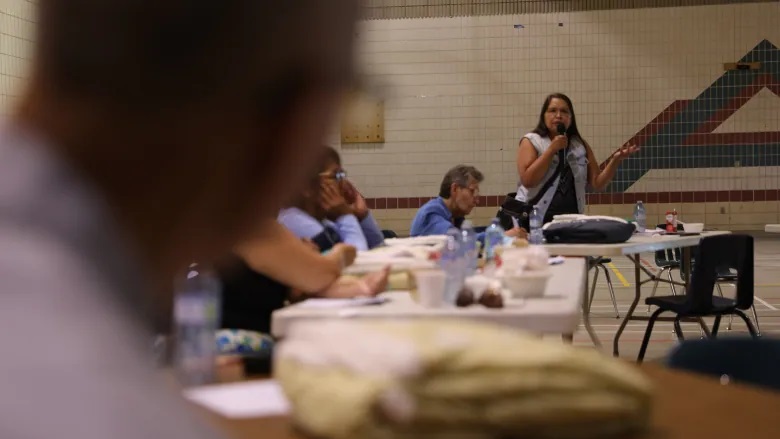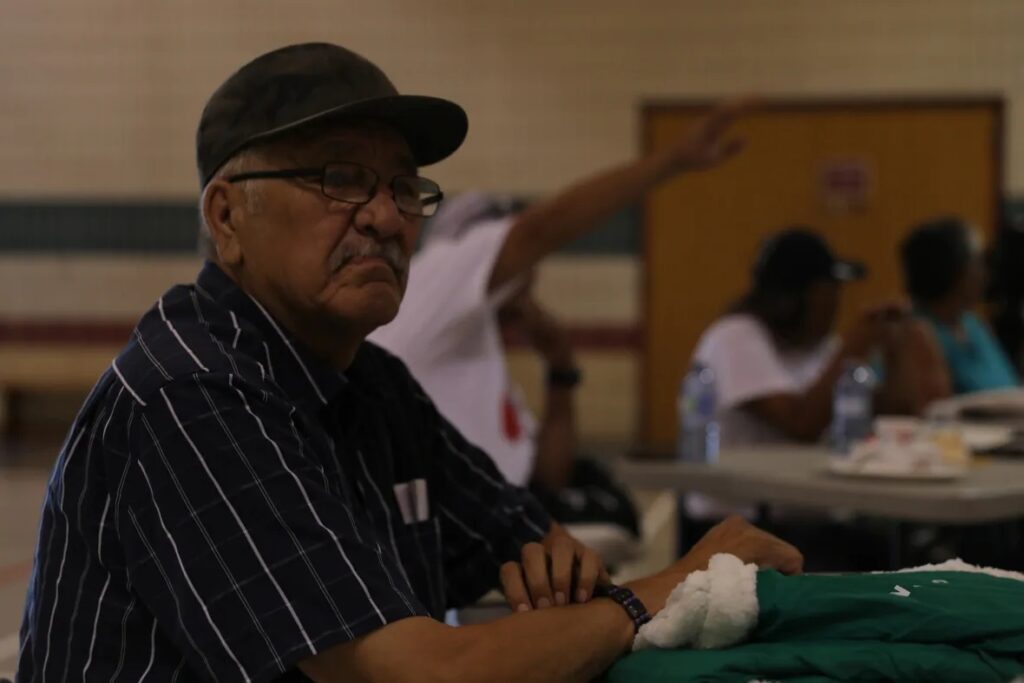KAMSACK (CANADA)
CBC (Canadian Broadcasting Corporation) [Toronto, Canada]
July 15, 2021
By Yasmine Ghania and Jason Warick ·
Survivors call for apology from Pope and release of church documents
WARNING: This story contains details some readers may find distressing.
Saskatchewan residential school survivors shared their painful and graphic stories Thursday — and the region’s Roman Catholic archbishop was there to hear them.
Survivors at the Cote First Nation told Regina Archbishop Donald Bolen he was brave for making the effort, but told him talk is useless without action.
Some said the church has betrayed them and broken too many promises.
“The church is going to crumble,” one survivor said. “We don’t need the church. We need our culture.”
It’s rare for such a high-level church official to spend a full day hearing the stories of survivors, and even more rare that Bolen drove to the Cote First Nation — a nearly 300-kilometre trip from Regina — to attend.
Survivors issued a series of demands for Bolen to pass on to Canadian bishops and the Vatican. They want the Catholic church to come up with the full $25 million promised back in 2005 in a fundraising campaign to compensate survivors for the abuse they suffered in Catholic-run residential schools.
They also want the church to release all records on unmarked graves and residential school documents, and they want Pope Francis to come to Canada to apologize.

“I hear you,” Bolen said, noting that a delegation is going to the Vatican later this year.
But survivors said it’s ridiculous a delegation has to go and beg the Pope to come, noting the Truth and Reconciliation Commission called on him to apologize on Canadian soil several years ago.
“We are not asking. We are demanding the Pope come here. We are demanding the church does what’s right. Why are we always forced to ask the church to do what’s right? My goodness. We are hurting,” one survivor said.

Bolen said he agrees the church has failed survivors. He said he was at Thursday’s gathering to listen, but will take action.
“We know the schools took you away from your families. We know you’re on a long healing journey. We want to walk with you and help in any way we can,” Bolen said.
WATCH | Archbishop of Regina Donald Bolen says archdiocese ready to help survivors:
“Apologies aren’t an endpoint – they’re a starting point.”
The gathering comes after Bolen gave permission for the removal of a plaque at the St. Philip’s Roman Catholic Church in Kamsack, Sask.
Elders of the Cote First Nation said the residential school teacher who donated it sexually abused many children.
Survivors speak
Madeleine Whitehawk of the Cote First Nation says it’s time for society to know the truth about what happened to children forced to attend residential schools.
“They didn’t have the chance to be elders, grandmothers,” Whitehawk said.
- Do you have information about residential schools? Email your tips to WhereAreThey@cbc.ca
Gene Shingoose, who was required to attend the school in the 1960s, says he still carries the scars of being there.
“We’re still hurting,” he said. “I don’t think that’ll ever go away.… It brings tears to my eyes because I suffered.”
WATCH | Gene Shingoose says pain of residential school ‘hard thing to let go’:
Saskatchewan bishops have agreed to revive the fundraising campaign for survivors, but none of their fellow bishops across Canada appear to be joining them.
Support is available for anyone affected by their experience at residential schools, and those who are triggered by the latest reports.
A national Indian Residential School Crisis Line has been set up to provide support for former students and those affected. People can access emotional and crisis referral services by calling the 24-hour national crisis line: 1-866-925-4419.
Do you have information about unmarked graves, children who never came home or residential school staff and operations? Email your tips to CBC’s new Indigenous-led team investigating residential schools: WhereAreThey@cbc.ca.CBC’s Journalistic Standards and Practices
